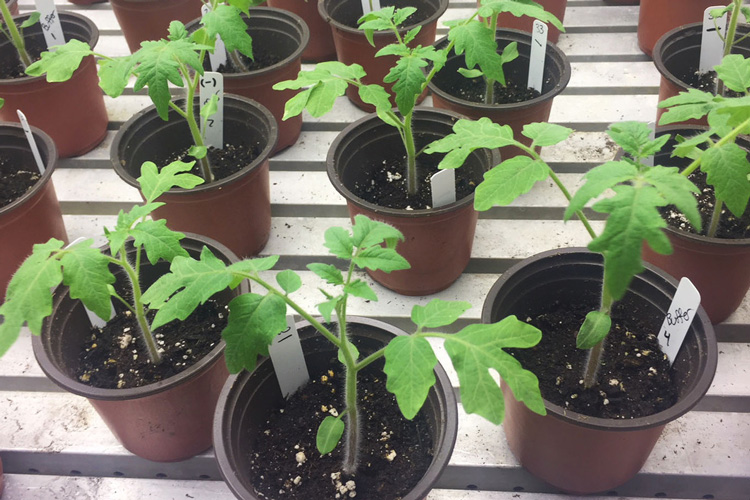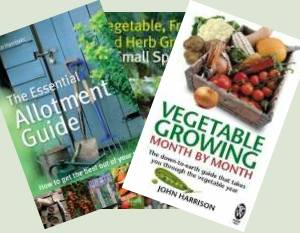I’ve just had an email with the subject line of “John, study shows using fertilizer increases plant disease…” which led me to an article entitled “Fertilizer Destroys Plant Microbiome’s Ability To Protect Against Disease”

A growth chamber packed with tomato plants sprayed with bacteria to simulate different leaf microbiomes and then challenged with a plant pathogen to measure how well the microbiomes protect the plant from disease. (Britt Koskella photo)
Now, this obviously grabs a gardener’s attention. In these days of information overload where we often don’t have the time to read beyond the headline as the stream of shares rolls down our social media some are going to assume that is the whole story and using fertilisers will make our plants ill. So the conclusion would be – stop using fertilisers.
The original article – Fertilizer destroys plant microbiome’s ability to protect against disease – is on Berkeley News from the University of California, Berkeley. UC Berkeley is a highly respected university of world renown – so a respected source that I would tend to trust.
Author Britt Koskella
The original research was undertaken by UC Berkeley biologists. The senior author being Britt Koskella , an assistant professor at Berkeley. She’s a respected scientist who has a number of published papers and describes herself
“I am an evolutionary biologist seeking to understand how interactions among species generate and maintain much of the diversity we see on earth. My work is focused primarily on host – pathogen coevolution, but with a building interest in the role that the microbiome might play in affecting this interaction. Using a number of bacteriophage – bacteria – plant systems, I have been working to address questions relating to the spatial and temporal scales of pathogen adaptation to their hosts, the impact of coevolutionary dynamics on community diversity, and the influence phages might play in altering the phenotype of their bacterial hosts in meaningful ways, for example by selecting for decreased virulence to eukaryotes.”
So far it’s looking pretty bad for the fertiliser industry, but read on please.
The actual study was carried out on tomatoes. Just tomatoes but I suppose you could reasonably extrapolate that to other species. Or can you? Perhaps tomatoes are unique in some way or it’s only true for Solanaceae (the nightshade family to which tomatoes belong).
The Study on Tomato Plants
They took tomato plants and sprayed them with bacteria cultured from healthy tomato plants. Some of the plants had fertiliser and some not. The biologists found that spraying tomatoes with microbes from healthy tomatoes protected them from disease-causing bacteria, but that fertilizing the tomatoes beforehand negated the protection, leading to an increase in the population of pathogenic microbes on the plants’ leaves.
But the researchers don’t yet know whether the increased number of bad bacteria on the leaves actually makes the tomatoes sick, the study clearly shows that fertilizer throws the community of microbes on the leaves off-balance.
Britt Koskella goes on to say
“When we change the nutrient environment that plants are in, we are fundamentally altering the plant-microbiome interaction and also, importantly, the microbiome-mediated protection of natural plant/microbe interactions.”
The article then goes on to say “That potentially could allow disease-causing organisms to enter the plant.” Yet the article later states.
“Koskella has suspicions about why fertilizer alters the microbiome, top among them the possibility that the nutrients make healthier leaves, which keeps all the microbes happy and obviates the need for the good microbes to out-compete the bad microbes. She and her group are now pursuing experiments to test that hypothesis.”
So rather than the click-bait title “Study shows using fertilizer increases plant disease” it would be as valid to state “Study indicates using fertiliser makes healthier plants”
Cherry Picking the Facts
The article title is a prime example of cherry picking facts to either back up a position or click-baiting just to increase visitor numbers. Fake news. The article itself is very interesting. Some results were surprising like using lower doses of protective bacteria was more effective than higher against one disease.
The study certainly highlights some interesting areas to study further. Biological control of disease would be the main one to my mind.
My Point
My main point is, I suppose, applicable to life in general as well as gardening and growing. Don’t just skim read, the Devil is in the detail. Consider if the information provider has another agenda or bias. Beware of click-bait!
I’m not immune to bias either but I do try and present ideas and arguments fairly. I’ve been accused of being “an organic beardy-wierdy” and “a tool of the chemical companies”. So just maybe I’m managing to achieve even-handedness.
Further Information
Original article in Berkeley News




John is this study aimed at just tomatoes? although this makes interesting reading any use of chemicals that could effect both plants and those who consume the fruits of the plant or veg for that matter it should be a cause of concern
so basically what chemicals would in your opinion fit this criteria for those of us that use say a tomato feed I have in the past used sheep droppings diluted down for my tomatoes without any problem and I have to say the seaweed based tomato fertilizer equally as good
so without digging to deep on this topic I would welcome your replies before commenting any further
many thanks RW
Hi Rowland
I don’t know if the study had an aim at tomatoes or what. Judging by the specialism of Britt Koskella I would think it’s more about microbial interactions. I’d like to have seen the original study rather than a slanted report.
It’s pure science rather than science with a specific purpose beyond knowledge. Often the most useful discoveries are made from pure science, people asking how things work or what causes something rather than looking to find a particular result. Testing hypotheses.
I don’t know what the fertiliser used comprised for the study. Don’t forget everything is made up of chemicals so when you say “any use of chemicals” your muck tea supplies chemicals that were in the sheep droppings to the plants.
I feel that the benefit of compost, muck teas, comfrey liquid lies not in them being natural as such but in them containing a wide range of micro or trace elements and encouraging the microbial ecology of the soil. We’re beginning to understand the miracle that soil is. The symbiotic interactions between plants and mycorrhizal fungi etc.
I dare say that it would have been interesting to run the same experiment but at various pH levels. We know pH has a large effect on the availability of nutrients to plants.
But, as I was getting at above, when you see dramatic titles on articles – including positives e.g. ‘Awesome Results from this easy growing tip’ – be very sceptical.
Hi John
I find your reply most informative although sometimes all these things are above my head
many thanks RW
Hi Rowland – me too!
Science shows us that aerodynamics prevent a bumble bee from flying. The bumble bee, not knowing this continues to fly around!
And don’t forget – Knowledge tells us the tomato is a fruit and rhubarb a vegetable, wisdom tells us which to put the custard on!
Also John, what contitutes a fertiliser, and what did the researcher use in her study? There are too many imponderables in the plant/nutrient relationships (eg, pH, as you mention)to draw any hard conclusions. I dig a hole for my tomatos, always outside, no greenhouse, then fill it with the usual garden compost (kitchen waste, leaves, grass clippings etc)mixed with the excavated soil and tomatos love it. no diseases. Embarrassingly prolific crops! Have I then been using fertiliser? Let’s leave these studies to the academics and garden on as we know how.
Still using your 2009 edition of ‘Essential guide’ – good advice therein.
I basically agree with you Boyd but I do like to experiment a bit and find better ways. It was the fact that I got this information on 2 newsletter lists and wanted to show how even in gardening there’s a lot of ‘fake news’ around.
Happy to hear you’re getting your money’s worth out of The Essential Allotment Guide. Hopefully you’ll wear it out and buy another soon 🙂 (JOKE!)
This basically advises you not to skim and believe just because the title said so! Also, I appreciate that you’ve come out of your way to give us the details on whether or not fertilizers really have bad effects on plants.